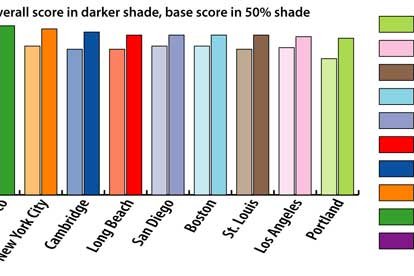The Human Rights Campaign unveiled its first-ever scorecard of LGBT municipal equality this week — and ranked Philadelphia among the top in the nation for its LGBT-friendly policies and practices.
Of 137 cities evaluated for LGBT policies and practices in the Municipal Equality Index, Philadelphia was the only one to receive a baseline perfect score.
The city achieved the maximum 100 points plus an additional nine bonus points out of a potential 20 bonus points. Seattle was the only city with an overall higher score; it achieved a total of 111 points, with a base score of 96, plus 15 additional bonus points.
Next in line was San Francisco, which earned 108 points, with a base score of 95 plus an addition 13 bonus points.
HRC legislative counsel of state and municipal advocacy Cathryn Oakley said the report was designed to shed light on the often under-addressed LGBT municipal work being done — and not being done — across the country.
“One of the things that’s really incredible about municipal work is how much can really be accomplished, and it’s not necessarily the most glamorous stuff that gets talked about,” Oakley said. “We wanted to highlight the great work people are doing at the municipal level and for some cities that have room to improve, show them the path forward.”
Gloria Casarez, the city’s director of LGBT affairs, said the city was grateful for the well-deserved ranking.
“We’re obviously really proud of this honor and of all the hard work we’ve done to make sure we have these policies in place,” he said. “We’re really elated that the Index is showing some of the work we’ve put in on these issues.”
Other cities that received an over-100 score because of bonus points include, from highest, New York City (106), Cambridge, Mass (104), Long Beach, Calif. (102), San Diego, Calif. (102), Boston, Mass. (102), St. Louis, MO (102), Los Angeles (101) and Portland, Ore. (100).
Philadelphia was far ahead of other cities in the region: In Pennsylvania, Harrisburg received a 76 and New Hope a 48, while New Jersey scores included Asbury Park with a 59, Jersey City with an 83, Lambertville with a 74, Ocean Grove with a 65 and Trenton with a 57.
Included municipalities were identified for their size, as well as for their having high concentrations of same-sex couples, according to the most recent U.S. Census.
Among the criteria were the cities’ nondiscrimination and relationship-recognition laws, the LGBT-friendliness of their employment policies, services and programs, law-enforcement practices and relationship with the LGBT community.
Several municipalities known for their LGBT-friendliness reported less-than-stellar scores: Rehoboth Beach, Del. (53), Provincetown, Mass. (59) and Northampton, Mass. (64).
Philadelphia and St. Louis, as well as other locales like Austin and Forth Worth, Texas, were singled out in the study for their high scores, despite not having a wealth of LGBT-inclusive laws at the state level.
“There’s been wonderful municipal work going on in Pennsylvania, and Philadelphia is clearly leading the way,” Oakley said. “That indicates that there’s momentum for this work being done and passion for these issues, and it’s something that the state might want to take notice of.”
The city missed bonus points for failing to offer fully transgender-inclusive health benefits and for not “grossing up” benefits to meet the tax burden for same-sex couples and also did not earn bonus points in two sections for not having had to overcome a restrictive state law.
Casarez said there is an intent to move forward with grossing-up and trans benefits.
“These are definitely things people here are looking into, things we’re interested in getting in place while [the Nutter administration is] still here,” she said. “These are things I think we definitely have a lot of ability to get some traction on, if not to get in place.”
Philadelphia’s nondiscrimination law was amended in 1982 to include sexual orientation and again in 2002 to include gender identity, and the city passed a domestic-partner law in 1996.
The city received full marks for its employment policies — including its nondiscrimination policy for city employees and contractors, domestic-partner and legal-dependent benefits, equivalent family-leave and the recently adopted measure that mandates domestic-partner benefits for employees of some city contractors.
Philadelphia received credit for having a human-relations commission, a mayor’s office of LGBT affairs, an enumerated anti-bullying policy, an LGBT Police Liaison Committee, for reporting hate-crimes statistics to the FBI and for having leadership that has taken public pro-LGBT positions and pushed for pro-equality policies.
The city earned bonus marks for its LGBT training and recruitment efforts, for offering city services tailored to meet the needs of particularly vulnerable LGBT populations, for having openly LGBT city leadership and for the city’s work engaging with the LGBT community at Pride events and in other capacities.
Oakley said HRC plans to double the number of cities included in next year’s MEI and expand the criteria to allow for improvement across all levels.
“One of the things we want to do, to keep cities like Philadelphia on their toes and so they don’t rest on their laurels, is to expand the criteria to continue to challenge cities that have earned 100 points to continue the incredible work they’re doing and inspire other cities to take on some of these wonderful initiatives,” she said.
